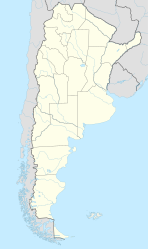La Rioja (Argentina)
| La Rioja | |
|---|---|
| City | |
 |
|
| Location of La Rioja in Argentina | |
| Coordinates: 29°24′45″S 66°51′15″W / 29.41250°S 66.85417°WCoordinates: 29°24′45″S 66°51′15″W / 29.41250°S 66.85417°W | |
| Country | Argentina |
| Province | La Rioja |
| Department | Capital |
| Founded | 1591 |
| Elevation | 515 m (1,690 ft) |
| Population (2010 census [INDEC]) | |
| • Total | 180,995 |
| Time zone | ART (UTC−3) |
| CPA base | F5300 |
| Dialing code | +54 3822 |
| Website | Official website |
La Rioja is the capital city of the Argentine province of La Rioja, located in the east of the province. The city has a population of almost 150,000 according to the 2001 census [INDEC].
La Rioja is located on the foot of the Velasco Sierras, 1,167 km (725 mi) from Buenos Aires, and 430 km (267 mi) from Córdoba.
It was founded in 1591 by the governor of Tucumán Province.
La Rioja was always the principal settlement of the province. The only time it was surpassed in population was in the mid-19th century when Chilecito, a small settlement near the Chilean border based around the Hacienda Santa Rita, became the largest town in the province. It wasn't until the early 20th century that La Rioja regained the status of being the largest city.
La Rioja has a semi-arid climate (BSh, according to the Köppen climate classification), with average temperatures of 5 °C (41 °F) to 19 °C (66 °F) winter and 21 °C (70 °F) to 35 °C (95 °F) in summer, but with maximum temperatures of more than 45 °C (113 °F). The average annual rainfall is 411.4 mm (16 in), falling almost exclusively during the summer when moist tropical air from the northeast enters the region. The highest recorded temperature was 46.4 °C (115.5 °F) on December 28, 1971 while the lowest recorded temperature was −7.2 °C (19.0 °F) on August 5, 1966.
The Museo Folklórico is set in a 17th-century building, and its displays include local chaya music and the Tinkunaco festival.
...
Wikipedia

